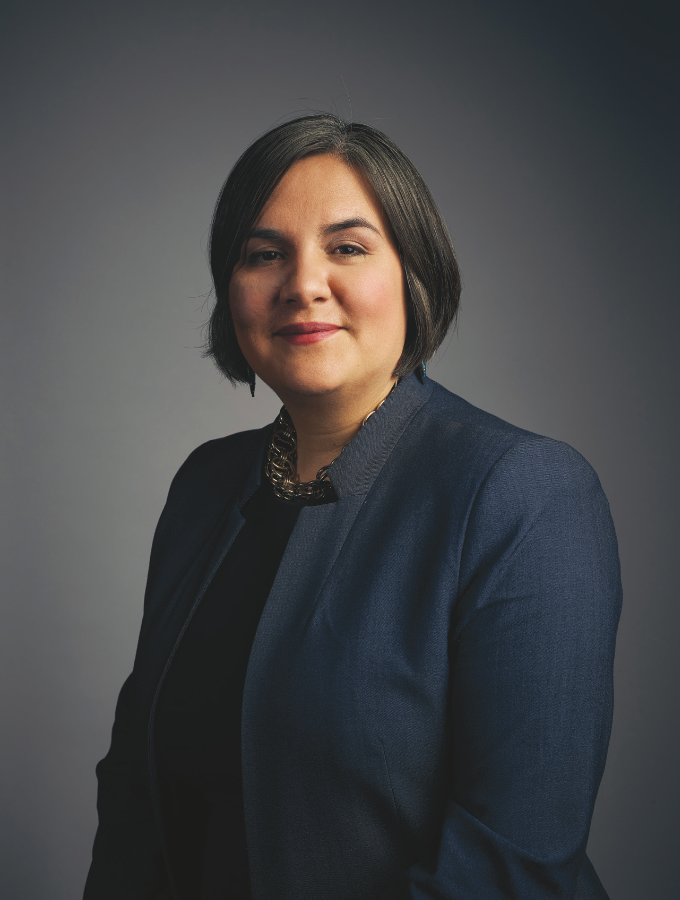The Power of Being a Teacher
ELISA VILLANUEVA
CHIEF EXECUTIVE OFFICER TEACH FOR AMERICA
Elisa Villanueva, as chief executive officer of Teach for America
is deeply involved in achieving the nonprofit organization's goal of providing low-income students with greater opportunities to reach their potential through a more equitable and outstanding public education experience.
AT THE CORE of this mission and the impetus behind Villanueva's 23-year TFA career Is what she views as a "crisis of in- justice," that where one is born determines that person's life prospects.
This problem was heightened by COVID-19, she said, "but long before the pandemic we saw how inequitable the education system was for so many kids and Latino kids are in the middle of that, left out of the system."
For Villanueva, a Rio Grande Valley native, overcoming this disparity hits close to home, emerging from her struggles during her first year at DePauw University in Indiana. Villanueva grew up family where education was central and fundamental to everything in her life and that getting a college degree was stressed as essential. Eli- sa graduated from high school in McAllen, Texas, and then with the encouragement of a mentor she left home to attend college in the Midwest, a place totally foreign to her, and enrolled at DePauw where people of color were seven percent of enrollment. Villanueva's goal was to become a lawyer and she expected to do well at the Indiana college. After all, she was the "kid who did absolutely everything right in school," she said, and was an A-plus student, student body president, and an all-star basketball player. But she quickly discovered that her education had not prepared her for the rigors of college, particularly in comparison to her peers who came from white, upper middle-class America. Three months into what she recalled as a shocking and deflating experience there was a pivotal phone call with her mother. Villanueva said she didn't think she was college material and could not figure a path forward. Elisa's mother said she was very sad for her daughter but made it clear that she could not come home until she got a college degree from DePauw.
"This was quite harsh at the time," Villanueva said, "but she also gave me a big gift because she said I know you can do it and I will not accept that you can't do it."
With her confidence reinflated, Villanueva persisted through year one. Then, she said, "I found my footing and I was doing really well." Villanueva also saw that her struggle was not unique for students coming from low-income Black and Latino communities, "I really got turned on to do something about that," she thought.
In those years, Villanueva learned about Teach for America and was drawn to its mission, and that "these are people who will literally tear down walls for kids," she said. "I found my passion in 1998 at the age of 22 and haven't looked back," she said of her joining the nonprofit.
TFA teachers are placed in in urban and rural school where the greatest need is and usually work with other corps members for two years. However, Villanueva stayed three years at a Phoenix, Arizona school. "I have found it is remarkable that eight in ten of our 60,000 Teach for America alum- ni continue to work in education or have careers serving a low-income community.
She returned to Texas where she began a 20-year path up the TFA leadership ladder, including the last six years in Houston as CEO. Villanueva said that to achieve TFA's goals requires a reappraisal of American education. "Educating children is a com- munity effort and everyone has different circumstances. I had a mom who is incredibly fierce and very clear of her expectations for me, and kids need that," she said. In addition, Villanueva said, "We really need to nurture their ability to be proud of who they are, to feel valued as human beings."
She observed that TFA teachers find that their students capabilities will be unleashed if they are held to the highest expectations and are provided with deep care and love, she said. One obstacle is that 27 percent of the children in public schools are Latino but less than 10 percent are Latino teachers, Villanueva said. There also is a disparity regarding principals and administrators, Villanueva continued, "We know that deeply matters. You can't be what you don't see and this matters to kids’ trajectories," she added.
TFA participants are among the most diverse educators in low-income communities, with 50 percent being people of col- or. Moreover, the TFA CEO said, "a third of our teachers are first generation college graduates and a third are STEM teachers.
Another challenge, Villanueva said, is how to prepare students for the unpredictably of the digital age job market, which is helped by learning the basics of math, computational thinking.
Studying history is important "to understand democracy and know how they are going to be able to contribute to strengthening our communities, our society, our country," she said.
"We have a once in a lifetime opportunity and an obligation to put equity and the needs of our kids front and center for education, she said. "We have to overcome this defining moment for our country that we all are going to be talking about in 10 to 20 years – question what did we do in our leadership roles – that we met the moment," she said.


